Interview: Robert Downey Jr., Zach Galifianakis And The Creators Of Due Date
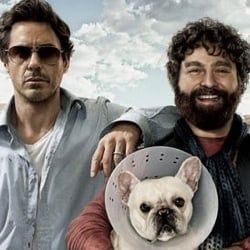
In 2009, Todd Phillips and Zach Galifianakis were part of the year’s biggest comedy, The Hangover. That same year, Robert Downey Jr. added another franchise to his resume, Sherlock Holmes, making his comeback all the more impressive after becoming Iron Man. There are few people in Hollywood living as high and this Friday they all come together for Due Date.
Chronicling a cross country from Atlanta to Los Angeles, Downey Jr. plays an expecting father who is forced into driving with a man-child, wannabe actor and his dog. A classic road comedy set-up, things naturally don’t go smoothly, leading to hilarious situation after situation.
Gathering at a press conference along with actress Michelle Monaghan and writers Alan Freedland, Alan Cohen and Adam Sztykiel, the filmmakers discussed who was the most professional actor on set, the inspirations behind the story and what it was like to spit in a dog’s face.
Michelle, this is the first you've worked with Robert Downey since Kiss Kiss Bang Bang. Have you seen each other very often since then and can you talk about why you wanted to do this movie? And Robert, Zach was very funny in Toronto talking about the two alpha males, you and Todd, creating this movie. Can you talk about your character and how it developed for this?
Michelle Monaghan: Obviously I'm very, very excited and jumped at the opportunity to work with Robert again.
RDJ: She did us a favor.
MM: I adore Robert. I had such an amazing experience on Kiss Kiss Bang Bang and so this was really exciting and obviously I'm a huge fan of Todd, and Zach is all right [laughs]. So I was very excited, and yes, I do get to see Robert occasionally and it's a nice mug to see him.
CINEMABLEND NEWSLETTER
Your Daily Blend of Entertainment News
RDJ: I got it pretty good. I don't want to offend our spouses but I'd love to have a baby with Michelle.
And can you talk about creating this character?
RDJ: Yeah, preparation for the character. I missed the shot to do it. I should've tried it nine months ago.
Robert, how much fun was it to gut punch that kid and what was it like working with kids in general?
RDJ: I love that we've actually gotten more push-back from spitting in a dog's face than punching a human child. Those are two things, Todd told me to do both of them. On one of them, on the day he said, “You should spit in that dog's face.” I was like, “Yeah.” Anyway, he goes, “I want you to spit in the dog's face.” I said, “That's so definitive,” and he goes, “I know but I think that people like you enough. I don't know if they will. Just spit in its face.” He loves dogs and I actually don't like dogs. So I felt kind of horrible and splendorous doing it. There was a question there somewhere but I'm sure whatever I said was far more entertaining.
Zach, did you have a problem with spitting in the dog's face? That was your dog.
ZG: Ummm…Well…Uhhh…
RDJ: Jesus Christ, answer the question.
ZG: Maybe.
RDJ: Yes or no. That dog made you sick.
ZG: Oh. I didn't like the dog. But I don't think that means it's okay to spit. Robert spit in my face every morning [laughs]. Listen, the dog and I have a certain bond –
Masturbation?
ZG: That's right.
RDJ: That's exactly right.
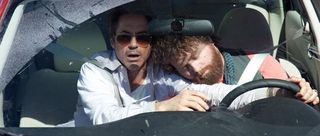
This movie is about fatherhood in many ways, both becoming one and losing one. Can you talk about fatherhood for a moment?
Todd Phillips: Well, yeah, I think that’s exactly right. I think that while it is a road movie and it is a comedy at it's core it’s a movie about Zach who's going through a drama, Zach's character – Ethan Tremblay – having just lost his father and Robert who's just about to become a father for the first time and kind of why they needed to meet at this moment and why Robert needed to travel with this man-child who was going through this traumatic experience, who, really, is a purely loving creature much like a child would be and just needed some adjustments, I guess.
Why did that story resonate with you and with the rest of you?
RDJ: Don't answer that, Todd.
TP: I refuse to answer that question.
ZG: I'll tell you. No. It's actually very personal, maybe –
TP: No, no. I think it's just an interesting take on it. For me personally it's an interesting movie to make. I tend to make films, I started making movies about college kids. I sort of grow with my movies. They're sort of always about my age range it feels. That's sort of the next step in life, having a kid or what have you and fatherhood. So it just seemed like an interesting thing to mine, both for emotion and then for comedy.
Robert, were you channeling a bit of Todd in this, especially in the look of your character?
RDJ: Well, I'm actually glad that you asked that because I think that every time I feel that I really hit critical mass and I'm in the right place is when I feel like the director and I become a third thing and that's the character. Even though the central subject of the movie is Ethan, the person who you're kind of seeing it through is Peter. Absolutely, and particularly when he said, “There's just a lot of hostility and there's a lot of fear and his kind of attitude and his anger is covering that fear and stuff,” and we like to commiserate. We're genuinely pretty happy guys but we love just getting crabby together. You remember that, don't you? And he is kind of like a hostage child that we've taken that's watching mom and dad, or dad and dad, just hash it out. But you're the first person who's asked that and I think it's absolutely true. I always feel like I'm playing an aspect of the director, particularly when he's auteur. To me it's a way of almost making him a proud parent. I'm a bit of an appendage of some aspect of the director.
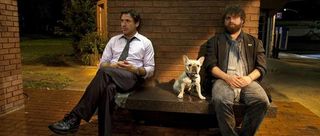
The film evokes Planes, Trains and Automobiles in its pairing and its plot. What classic road films were you all thinking of as inspiration and or templates for the film?
TP: I'll go first. I'll just say that the movie that we talked about the most, oddly, was Rain Man. That to me is a road movie and a great road movie and that was a movie that came up a lot as well as Midnight Run. There are comparisons to Midnight Run, but there are comparisons to Planes, Trains and Tommy Boy and other things, but I think the movie that we talked about the most was Rain Main.
RDJ: Michelle was saying Wages of Fear quite a bit, too. Didn't you say something about that?
MM: I did. I did that and Scooby Doo.
RDJ: “I hope you guys don't blow up the studio.”
And the writers?
Alan Freedland: Well, Todd said it right, when Alan and I wrote the movie we were thinking of a lot of road movies but Midnight Run was absolutely one that we thought about. We have two characters who are opposite of each other and they're stuck in a very high pressure situation and are out of their comfort zone and you get to reveal a lot of character in those situations.
Can you talk about how you worked out or developed the scenes together on this and also if it does resonate with audiences would you like to see a franchise out of this or are your franchise dance cards full?
TP: Well, the way that we worked it out is the way that I've done it on all my movies, but this film in particular had an interesting process because Robert has a very producorial brain. He's basically another writer in the room. Zach is really an empty vessel. He just sits and waits [laughs]. No. But Robert and I had lots of spirited discussions every morning about it. We had the pages and he'd go, “Okay, what are we really doing?” Not to discredit the writing process which I was a part of, too…
RDJ: It was a great script which just made me hate it all the more.
TP: Yeah. Robert has an aversion to things that are typed, I've learned. So even if we just rewrote the scene…
RDJ: Well done, by the way, fellas.
TP: If we just we rewrote it on a napkin, even if it was the same scene, he felt better about it. But we took it apart and the great thing about Robert, and I've said this before, he made me a better director and the reason for that is that he's constantly challenging what we're doing everyday in the larger, bigger picture. A lot of times you hear about actors and they're worried about their lines and their thing and Robert thinks of the movie as a whole. He thinks of every character in the movie as the whole and that's what I mean by a producorial kind of approach to it. For me it was an unequaled experience. I've never experienced anything like it. I think that was the process. You witnessed a lot of it.

ZG: Yeah. I think that each morning there was a meeting. I would read the minutes from the last meeting [laughs]. Todd yells. Robert yells back. Let’s get on with the new meeting. No. There was a discussion for at least about an hour each morning it seemed like, sometimes longer –
TP: Sometimes three.
ZG: Yeah, and it really helped it. It really did. As far as the franchise stuff goes we were kind of fantasizing on the last day certainly that I was working – I can't remember – and it was towards the last scene or it was the last scene at the hospital; there was a moment and I don't know if you recall it but Ethan says to Peter, “Call me.”
RDJ: Okay, yeah.
ZG: Then I'm like, “No. Call me tomorrow, whatever I say.” We were fantasizing, like, I've never seen a movie jump genres. So the sequel would be more like a Cape Fear thing. My character is not actually dumb at all. It's just been –
RDJ: An elaborate ruse –
ZG: This whole time and I then stalk Robert's family.
TP: I thought what you were going to say is that it'd be interesting to just pick it up from a minute later. Instead of jumping a month or a year that it's literally from that moment that you left. That would be fun.
ZG: That would be great.
TP: There you go. That's how ideas are made.
Can you talk about the franchise and the process, Robert?
RDJ: Yeah. That's what I need, three franchises so that I can utterly have a personality meltdown in real life, but I would do it with these guys. I have to say, too, that there was something so cathartic, and as we both know from the writers and Michelle peripherally and our involvement in it, I think it was just the most healing project that I've ever worked on. And I've never come up against anyone who is so confident and so thoughtful and so spontaneous that it's not even daunting. He's just in a class by himself and I think that Todd is the best director that I've ever worked with, bar none.
TP: Did you all get that?
ZG: And don't forget about the part before that, which I thought he was talking about you the whole time.
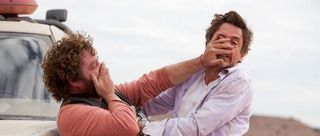
Often modern protagonists get sanded down from focus groups into this kind of vanilla blandness. Was it refreshing to play someone with so many real and yet repellent moments in their arc?
RDJ: Absolutely and I don't know why but it was an invitation for me to get in to touch with everything that annoys me about everyone and all the fear that I have about everything that everyone can relate to. So in a way I felt like I was a conduit to this. It was very pleasant. I don't know why. I'm not a method guy. I can't be bothered to have a method. I just want to be a part of a good movie and I can't stand to be surrounded by morons but we had such a great group of people on this whole thing. It's funny, yeah, because you could say this is a two dimensional commercial comedy. I feel that this is the second greatest story ever told.
The first being?
RDJ: Oh, come on! The Bible.
Can you talk about Juliette Lewis because she's had a great year of cameos. If you did do the Cape Fear thing would she be in it?
TP: She would but I don't think that Zach could fit his finger in her mouth [laughs].
RDJ: You’ve got to hand him the baton there. Do you want a piano?
ZG: At least my father didn't leave me [laughs]. Okay? News is out. That's what the father issue is for. There it is.
TP: I love Juliette Lewis and she's been in three of my movies now, four, and she's one of those people and Michelle is the same way, quite honestly. This movie is about these two guys and the other parts in the film aren't a huge deal, aren't huge pieces and Robert said it best, Michelle did us a favor. She came in and she worked for those days and she brought what she brings and she's amazing and Juliette the same thing. Jamie Foxx. Danny McBride. I like to think that they're actors and they like to play. So if it's a two day part for Juliette or a one day part for Danny McBride you call them up and say, “Hey, I'm doing this great thing with Robert and Zach, would you come down and just fuck around for the day? We're going to have fun.” I think ultimately that's how it works. But Juliette in particular is just stupendous and she's sort of sunshine to me when I look at her and I think that she brings so much to small roles and large roles.
RDJ: I love how riveted she is by your monologue, too. You'd have thought that she was hearing [Lawrence] Olivier bring one on. She was mystified.
With upcoming news, Robert, how do you feel about Iron Man 3 going to Disney?
RDJ: Love it. What's that mean? [laughs]
That it'd be released under Disney's deal with Marvel?
RDJ: Well, you know what, I really loved our relationship with Paramount but to me, the main thing is that I don't care about any of that. They're going to make those moves. I just want to make a great movie and thanks to my tutelage under two guys who know how to play the power – Zach and Todd – I know exactly what to do with Iron Man 3.
TP: Love it.
RDJ: That was almost mad with power [laughs].
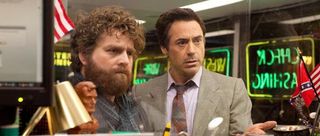
Robert and Zach, do either of you guys have friends like the people you portray in the film and what do you think is the definition of friendship?
RDJ: To me friendship means loving tolerance.
ZG: I think that Robert and I formed a friendship on this movie, albeit a very antagonistic but fun relationship. He's really kind of very, very funny and he makes fun of people a lot and for some reason I like to be made fun of even if it has to do with my fingers not fitting in someone's mouth. That's really hilarious.
Can you talk about how Sherlock 2 is going as well as whether or not you'll be in Gravity? Zach, there's a viral video going around the internet of an interview you did with a Dallas Morning talk show guy and it's very reminiscent of 'Between Two Ferns'. Is that real or is that staged?
RDJ: I don't want to waste time talking about other projects. Sherlock 2 is fantastic. We had decided that we were going to do some viral videos to promote the movie and then we could barely hit our ass with both hands just to show up and do the regular press but the idea was that we were going to have this double inner monologue going. We were going to walk in Venice Beach down to the beach and shake hands and then walk away from each other. That would only take an hour shoot and then we were going to lay the most awesome double internal voice-over over it and it would've been – we'll never get to it – the greatest viral video of all time. So just imagine that we had the time to do that and we're happy to comment on that because we'd like to know what it would've been [laughs].
ZG: I don't want to give away the thing because I think sometimes that spoils it.
Which of you would be more likely to breakup horribly in the middle of a take and Todd can you weigh in with a verdict?
RDJ: Let me put it this way, I'm eighty five times more professional than Zach but I was hoping that we'd have some good gag reels so maybe I'd chuckle a little bit more. He might not actually know how funny he is sometimes, too.
TP: Yeah. Zach doesn't really breakup. He'll read his line halfway and [cough] and start over.
RDJ: It’s a ghastly tick. It's my favorite thing about him, to tell you the truth, particularly when we're doing press and it takes him forty five years to answer one question. He's trying to think about what the answer is and then he stutters and then he judges himself...
TP: And then he starts over and that would make Robert laugh.
RDJ: “Sonny stop it… [clearing his throat], Stop it sonny, we're going to be late [clears his throat]…” and the film is rolling and I'm just there, like, “This is an anthropological study. Now what are we supposed to do? When will you be done? That'll be my cue.”
ZG: I know my face is turning red. I don't want you to interpret it as being embarrassed. It's rage [laughs]. The color of my face is rage.
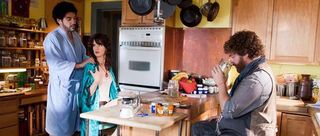
Can you talk about the opportunities that have opened up for you as a result of The Hangover? I saw people in costume as your character from the movie at Halloween last year. Can you talk about that, being an iconic character?
ZG: We were shooting Due Date in Albuquerque last year on Halloween and I went to a Halloween party. I didn't really know anybody. I went with a couple of people from work and I was just dressed like this and there was a guy there dressed as the character from The Hangover. I thought that it would be interesting to walk up to him and say, “Hey. You're dressed as me. I'm the real person.” He goes, “Yeah, right,” and he just walked away [laughs]. So that was a bit freaky. Well, Todd has told me as of late that I've never thanked him for anything and I'm here just to say that I'm probably not going to do it today [laughs]. In all honesty it's strange to have a little bit of…Todd helped me. He took a chance in plucking me out of the standup scene and nobody knows a movie is going to be so big and we just kind of got lucky and I'm thrilled that it happened.
Robert, your character has an awful lot of insight into acting for an architect. Was that part of his background. Thinking about your character in Tropic Thunder you seem to take great joy in poking at the actor's process. Is that true?
RDJ: I think that Todd and I said his neighbor was a casting director. So it's like I tell you that the Guggenheim opened in '59 or whenever it was, '69. You tell me about whatever it is going on, casting a show and everyone wants to be an actor, but everybody knows that everybody thinks that they want to be an actor and has no chops and is going out of it. I think that I'm worried for him and so my fear that this moron that I'm stuck with, I'm actually trying to give him some insight and I'm just mad at him when I give it. But also I mean, and this is a disgusting thing to say, and it speaks to my – it's not as bad now – hugely inflated ego at the time. I felt that it was my duty to teach this guy to fucking act. But he already knew how.
Zach, we all know you as a comedic actor but you have a pretty powerful scene in this film, too. Was it hard to switch gears in that scene?
ZG: No, it's not. It's fun to do. I think that probably, editorially, it might be difficult to put together but I don't know. If you can make people a bit emotional watching a scene and then make them laugh prior to that, I think you don't see it that often. I think that Todd got it right, but the whole thing about that scene, the bathroom scene I guess is what you're talking about; to me it's not so much what Ethan does but it's the look on Robert's face that I think sells that, as Robert told me yesterday [laughs].
TP: It's true. It's not the action. It's the reaction. Robert is watching this all happen and to me, I agree with that. It's just all on Robert's face as he realizes, “Wait a minute, this guy is actually going through trauma and is having a breakdown.” It was very cool to watch.
Do you think your actors, the whole process, did all your actors leave their comfort zone?
TP: I don't know about that. I don't know if Robert leaves his comfort zone because I think that Robert is capable of anything, quite honestly, as an actor and I think that Zach has so much that we haven't even seen yet in Due Date or in his other roles. I don't know that we left our comfort zone. I do think that what Zach just touched on is the key to Due Date which is that the movie takes these tonal shifts that I don't think you see in a ton of comedies. For me it was the fun part of making it, the challenging part of directing it and I think for these guys possibly the challenging part of doing it. You're in a bathroom scene. He has a breakdown. This guy is actually feeling emotional and in the next scene he's masturbating with his dog. The audience, to stay with us and stay on that ride, is what makes the movie connected and work. That's what I'm most proud of with Due Date.

Eric Eisenberg is the Assistant Managing Editor at CinemaBlend. After graduating Boston University and earning a bachelor’s degree in journalism, he took a part-time job as a staff writer for CinemaBlend, and after six months was offered the opportunity to move to Los Angeles and take on a newly created West Coast Editor position. Over a decade later, he's continuing to advance his interests and expertise. In addition to conducting filmmaker interviews and contributing to the news and feature content of the site, Eric also oversees the Movie Reviews section, writes the the weekend box office report (published Sundays), and is the site's resident Stephen King expert. He has two King-related columns.
Most Popular




